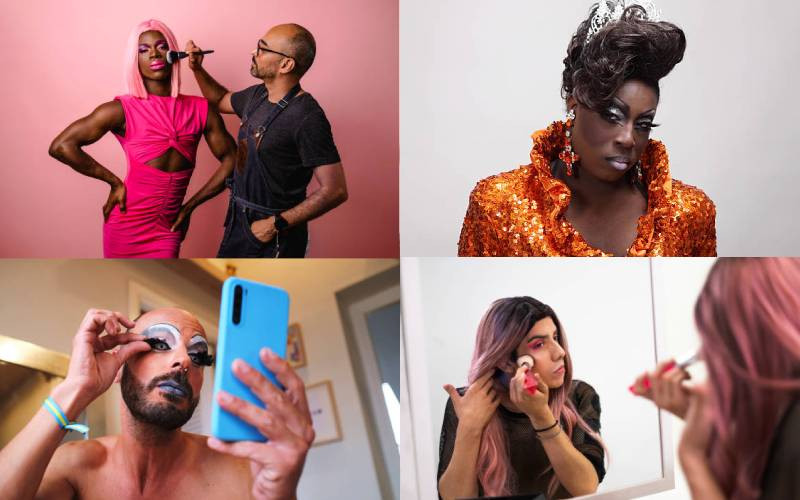
In the vast expanse of social media, a curious and captivating trend has emerged, capturing the imagination of countless individuals nationally.
Men, with a flair for the dramatic, are donning wigs, heels and fabulous outfits as they embrace their 'alter egos' in the virtual realm.
What motivates this crossdressing phenomenon?
The comical aspect of blurring gender lines with humour
One of the most captivating facets of men's online crossdressing is the element of humour. In the virtual world, men are showcasing their cross-dressing talents with a touch of hilarity and a penchant for self-parody. It's an alluring blend of art and comedy, breaking down stereotypes and celebrating diversity in a light-hearted way.
Statistics indicate that videos and social media posts featuring cross-dressing men often receive a significant number of views, likes, and shares. The comical twist to online crossdressing invites viewers to ponder the absurdity of traditional gender expectations, challenging them to rethink their own beliefs.
Unveiling transvestic disorder in DSM-V-TR
The fascination with online crossdressing has its roots in the DSM-V, the fifth edition of the Diagnostic and Statistical Manual of Mental Disorders. Within its pages lies Transvestic Disorder, a diagnostic category that attempts to explain the phenomenon.
- Self care: The path to being a better parent
- How to deal with sibling rivalry
- How to introduce children to budget literacy
- Modern fatherhood: Rise of the present dad
Keep Reading
However, it's essential to note that this diagnosis has drawn significant controversy and criticism. Transvestic Disorder suggests that men cross-dress for sexual arousal and that they experience distress because of it.
Interestingly, this viewpoint is being challenged by a growing understanding of gender identity and expression. Not all men who cross-dress experience it as a disorder but rather as an exploration of self and style. Many see it as a way to break free from societal norms and express their creativity.
Being a crossdresser does not necessarily mean that a man is gay, most tranvests are heterosexual. Also, no correlating data was found on absent fathers in childhood leading to crossdressing in a study that was done before the publishing of 'The Journal of Sex Research, 1983.'
African perspectives on crossdressing
As the spotlight shifts to African cultures, one can't help but marvel at the vast diversity in perspectives on cross-dressing. In many African societies, crossdressing has historically been met with mixed reactions. Some view it as an art form and an exploration of identity, while others adhere to more conservative beliefs.
In Nigeria, for instance, drag artists have gained immense popularity in recent years, celebrated for their unique fashion sense and daring performances. Their acts often blend humour, satire, and social commentary, challenging stereotypes and norms. This embrace of crossdressing, combined with traditional African cultures, creates a fascinating juxtaposition of old and new.
Crossdressing as a marketing strategy
Marketers have not missed the enchanting allure of online crossdressing. As more fashion brands recognise the trend, gender-neutral clothing lines are becoming increasingly popular.
Statistics reveal that sales of gender-neutral and unisex fashion items, makeup, et cetera, have seen a considerable surge in recent years. By celebrating the idea that fashion knows no boundaries, companies are tapping into this new and exciting market, driven by the subversion of gender norms.
Online crossdressing has undoubtedly paved the way for reimagining fashion and style. The appeal lies in the empowerment to embrace and express one's identity without restrictions. Fashion and beauty brands have seized the opportunity to cater to a broader audience, recognizing that their clothing can be a form of self-expression and a celebration of individuality.
While it may have been pathologised in the past, the trend is rapidly gaining acceptance and appreciation. With humour and creativity, it not only entertains but also challenges societal norms, redefining the rules of fashion and self-expression.
 The Standard Group Plc is a multi-media organization with investments in media
platforms spanning newspaper print
operations, television, radio broadcasting, digital and online services. The
Standard Group is recognized as a
leading multi-media house in Kenya with a key influence in matters of national
and international interest.
The Standard Group Plc is a multi-media organization with investments in media
platforms spanning newspaper print
operations, television, radio broadcasting, digital and online services. The
Standard Group is recognized as a
leading multi-media house in Kenya with a key influence in matters of national
and international interest.

